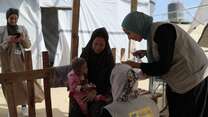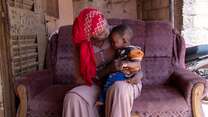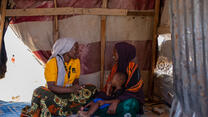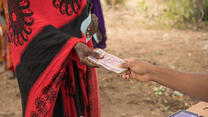WHO WE ARE
The mission of the International Rescue Committee (IRC) is to help people whose lives and livelihoods are shattered by conflict and disaster to survive, recover and gain control of their future. Our vision is that the IRC will lead the humanitarian field by implementing high-impact, cost-effective programs for people affected by crisis, and shape global policy and practice by sharing our learning and experience with others.
All IRC programs are designed to achieve meaningful change in people’s health, safety, education, economic wellbeing and ability to influence the decisions that affect their lives. The Economic Recovery and Development (ERD) unit at the IRC works to ensure that those we serve have their most basic survival needs met and have the combination of assets and income to prosper.
Cash relief programming is one of the fastest growing evidence- based interventions in the humanitarian community. Over the next five years, the IRC seeks to deliver 20-25% of its humanitarian assistance through cash, up from 6.26% in fiscal year 2015 and to have active cash transfer programs in 75% of the IRC’s country offices.
WHY OUR WORK MATTERS
Evidence shows that in many contexts, cash relief is a more efficient and cost-effective solution in crisis settings than food, clothing and in-kind donations. It empowers people to take back control of their lives by providing them with the freedom to make decisions for themselves about their and their families’ needs.
60% of all refugees and internally displaced people (IDPs) live in urban settings. During crisis response, it’s necessary to focus on the recovery of local economies and markets. Cash relief provides financial injections into local economies, which has benefits for local vendors, producers, markets and trade. Refugees are more accepted by host populations as they are seen as customers and consumers of local businesses. In Lebanon in 2014, every $1 spent by Syrian refugee beneficiaries generated $2.13 of GDP for the Lebanese economy.
The IRC’s organizational strategy sets an ambitious target of delivering survival assistance including cash relief within 72 hours of an emergency. Getting living-saving assistance into the hands of those affected by disaster is more than an organizational commitment; it is a moral and ethical imperative. Current cash relief programs are characterized by long start-up times at the outset of a crisis. Therefore, the IRC is focusing on preparing crisis-prone countries to deliver cash relief in emergencies.
WHAT WE DO
IRC practitioners provide technical assistance to more than 30 country programs. Technical advisors are charged with staying abreast of the best available research and practices in their respective fields and sharing these with the IRC’s frontline teams. They also lead advocacy strategies to encourage partners and policy makers to adopt the interventions proven to be effective based on our research and experience.
The IRC delivers cash relief to people affected by crisis and conflict to assist them in situations where opportunities to find a job and earn an income are extremely limited or have ceased to exist. To meet the goal of delivering life-saving relief within 72-hours of an emergency, the IRC’s preparedness work focuses on pre-positioning operational and cash program design elements to significantly increase the speed, cost efficiency, scale and responsiveness of humanitarian interventions to the needs of vulnerable populations. Delivering cash relief within 72 hours of a crisis requires being operationally ready to respond, laying as much of the groundwork – assessments, planning, decision-making, and implementation – ahead of time, and ensuring that the enabling environment is conducive to the quick delivery of cash relief. To do this, the IRC is focusing on three key pillars of work.
Operational Readiness
The IRC is ensuring that all levels of the organization are ready to appropriately deliver cash relief quickly in emergencies.
- Systems and Procedures: The IRC is working closely with all IRC programs, Finance and Global Supply Chain departments on a series of initiatives to mainstream and streamline cash relief programming across the IRC’s operational departments and staff.
- Capacity, knowledge and skills: To ensure that staff have the capacity, knowledge and skills to implement high-quality cash relief programming, the IRC has recently released several market e-learning modules and is currently developing a comprehensive in-person training, online trainings, coaching and mentoring and accompanying tools, resources and guidance to strengthen the knowledge base and technical skills of our staff across all departments.
Programmatic Pre-Positioning
Pre-positioning cash programs in countries that experience cyclical disasters is central to ensuring the IRC is prepared to deliver cash relief programming when a crisis strikes.
With support from MasterCard Worldwide, the IRC has developed a Cash Program Prepositioning (CPP) process and toolkit to provide rapid cash delivery to beneficiaries in crisis settings across all IRC country offices. The CPP process provides a blueprint for prepositioning cash and voucher programs to respond to a specific crisis – either slow or rapid onset. Preparing and pre-positioning cash transfer programs before emergencies cuts down start-up times, increases the scale of emergency response programs, and improves the IRC’s use of evidence-based emergency interventions to rapidly respond to client needs in crises. This approach has been piloted in Ethiopia and is currently being implemented in Pakistan, Somalia and Niger.
In order to offer a ready-to-use payment method in contexts where local financial infrastructure prohibits the use of cash distribution, the IRC created a Global Payments Toolbox (GPT) that pre- establishes master service level agreements with global prepaid card, remittance and mobile money providers.
Enabling Environment
Electronic payments are an optimal way of transferring aid to more people more efficiently; laying the physical digital and financial infrastructure down in high-risk countries prior to crises is imperative to making digital payments available. Only 30% of countries facing severe humanitarian crises have the requisite digital and financial infrastructure in place to enable digital payments in an emergency. This means countries most likely to face emergencies are some of the least prepared to respond to crises using digital cash relief.
To inform the debate and generate further evidence, the IRC commissioned two linked research projects to understand how to prepare for scaled-up humanitarian cash transfers. The first report, Making Electronic Payments Work for Humanitarian Response, investigates the current state of readiness of e-payment systems to deliver emergency cash transfers. The paper explores the extent to which existing resilience and digital finance efforts prepare e-payment systems to meet the specific needs of humanitarian agencies when disasters strike. In doing so, the IRC proposes a framework to comprehensively analyze e-payment preparedness at the country level, and evaluated six countries to identify their level of readiness and the activities needed to strengthen e-payment responsiveness to shocks.
The second report, Untapped Humanitarian Demand: A Business Case for Expanding Digital Financial Services, uses a return on investment (ROI) model to demonstrate the business case for expanded coverage of digital financial services (DFS) in crisis- prone areas. By modeling the potential ROI for DFS providers from meeting aggregate humanitarian demand, this paper aims to motivate greater investment in digital financial services in areas vulnerable to emergencies, incentivize humanitarian-private sector cooperation prior to crises, and encourage development and humanitarian actors to coordinate their respective DFS-related initiatives.



